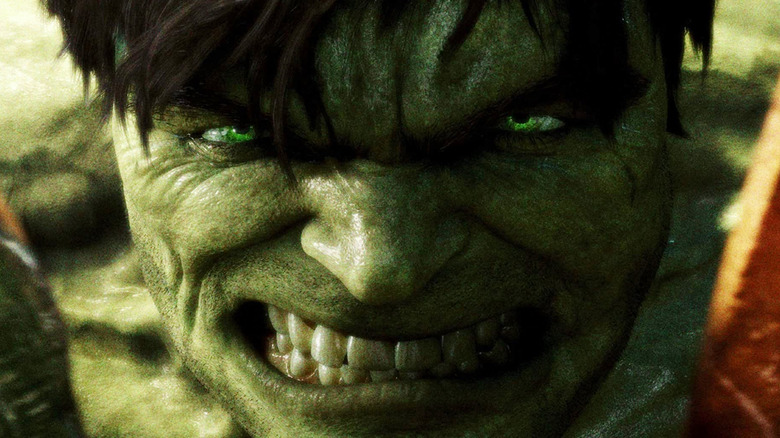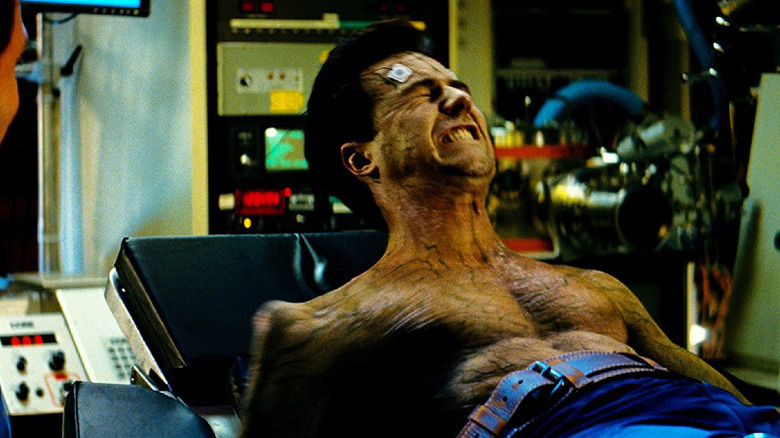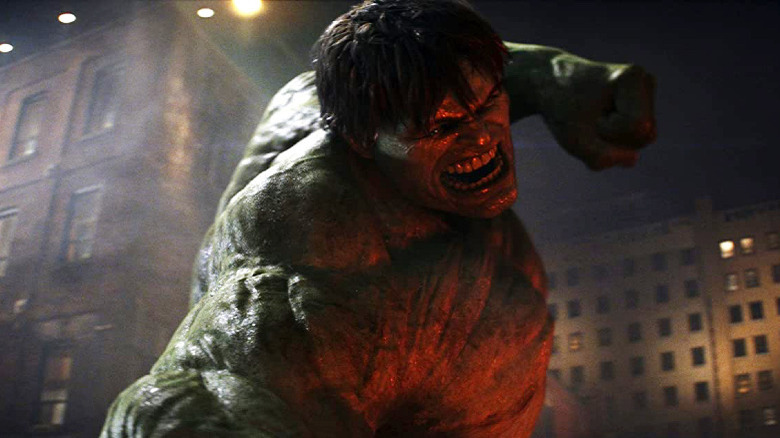The Incredible Hulk Director Wanted An Approach That Was Less Ang Lee And More Lou Ferrigno
Once the Bruno of the Marvel Cinematic Universe, Louis Leterrier's "The Incredible Hulk" has seen its reputation slowly rehabilitated in recent years. The 2008 film remains the first and only movie to feature Edward Norton as wayward scientist Bruce Banner, as well as The Other Guy's lone solo outing in the MCU under the terms of Marvel Studios' complicated deal with Universal for the Hulk screen rights. 14 years later, it remains the MCU's lowest-grossing release at the box office, though it no longer holds the worst critics' score on Rotten Tomatoes. Progress!
Norton's creative clashes with Marvel Studios infamously led to them parting ways after "The Incredible Hulk," with Mark Ruffalo taking over the titular role starting in 2012's "The Avengers." That and the movie's middling financial performance a mere month after "Iron Man" rocked the scene were all the reasons the House of Ideas needed to ignore Leterrier's Hulk adventure for years. Time heals many wounds, however, and in 2016, "Captain America: Civil War" saw William Hurt reprise his "Incredible Hulk" role as Thaddeus Ross.
Stephanie Panisello would later voice Betty Ross from "The Incredible Hulk" for an episode of Marvel's "What If...?" animated series in 2021, replacing Liv Tyler in the role. That year would also see Tim Roth reprise his role from Leterrier's movie as the Abomination in the film "Shang-Chi and the Legend of the Ten Rings." Roth has since come back for "She-Hulk: Attorney at Law," a show that has the Abomination's human half, Emil Blonsky, turning over a new leaf in prison and even opening a wellness retreat for reformed super-villains upon being granted parole.
The irony in all this? "The Incredible Hulk" itself was once meant to, essentially, rehabilitate the big green guy's film series after Ang Lee's notorious 2003 movie "Hulk."
'First of all I loved Ang's movie'
Lee's pre-MCU Marvel movie, while unruly and not entirely successful, is the type of experimental, risk-taking enterprise that more comic book films should aspire to be. "Hulk" digs deeply into Bruce Banner's tormented, fractured psyche and his toxic relationship with his father. It's a somber drama for long stretches of its runtime, only to erupt into pyrotechnics when Bruce transforms into his green alter ego, trashing science labs or creating mini-earthquakes on the streets of San Francisco. Lee's attempt to imitate the look of comic book panels with his use of split screens and stylized scene transitions only further compounds the movie's idiosyncratic design.
In a June 2008 interview with Collider, Leterrier voiced his admiration for Lee's "Hulk." But at the same time, he felt its approach simply wouldn't work for the MCU and its younger target audience when he directed "The Incredible Hulk":
"First of all I loved Ang's movie. I really do love Ang's movie because as a director, as all of you guys, you've seen the cinema in Ang's movie. It's beautiful. It's a great movie. But if you're 7 years old — 8 years old, you're totally lost in Ang's movie so I wanted to give it more of an overall approach. You didn't have to be a fan knowing the Hulk story to love this movie — hopefully, my movie, or to be 7 and 13 and a boy to like this movie. I wanted to make it like a broader and like a general — more general — kind of a movie. And that's what I did."
A little less Frankenstein, a little more Fugitive
Continuing, Leterrier noted that Marvel comic books weren't widely available in France when he was growing up. Instead, much of his knowledge of the Hulk character came from the "Incredible Hulk" live-action show, which aired for five seasons from 1977-1982 and starred Bill Bixby as Dr. David Banner (yes, "David") opposite bodybuilder turned actor Lou Ferrigno as The Other Guy. Leterrier cited Hulk's humanity as the reason he loved the series, explaining:
"It was a simple story of a man who has a problem who goes from... you know he's chased. You know it was a fugitive story. He's chased from town to town trying to get his life back together. Tries to cure himself, you know get rid of his thing. And definitely throughout the seasons is discovering the hero within. That this thing inside is maybe not bad and maybe good. So that was the very simple emotional approach I took, you know."
If Lee's "Hulk" is "Frankenstein" then Leterrier's "The Incredible Hulk" is "The Fugitive," as Leterrier's comments suggest. It's a much more action-driven film where its protagonist goes on the run with a clear goal in mind, as shot and edited in the "Transporter" and "Now You See Me" director's usual highly-kinetic style. Leterrier argued that the two movies aren't so much different for the sake of it as they are "complementary." This is also why he eschewed rehashing Hulk's origin story in his film, even though it's officially a reboot of the Hulk character for the MCU rather than a sequel to Lee's movie.
Perhaps Leterrier and Lee's films are best appreciated as just that — two flawed but distinct takes on the same superhero. If only all Marvel characters were so fortunate to receive that treatment.


